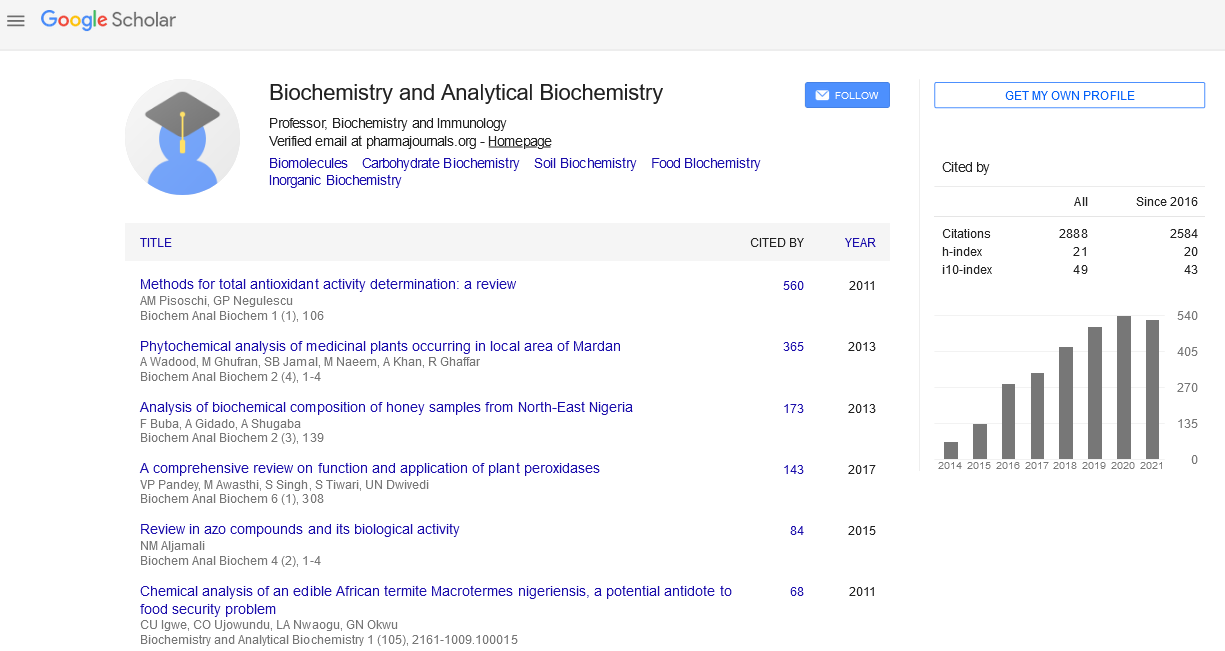Indexed In
- Open J Gate
- Genamics JournalSeek
- ResearchBible
- RefSeek
- Directory of Research Journal Indexing (DRJI)
- Hamdard University
- EBSCO A-Z
- OCLC- WorldCat
- Scholarsteer
- Publons
- MIAR
- Euro Pub
- Google Scholar
Useful Links
Share This Page
Journal Flyer

Open Access Journals
- Agri and Aquaculture
- Biochemistry
- Bioinformatics & Systems Biology
- Business & Management
- Chemistry
- Clinical Sciences
- Engineering
- Food & Nutrition
- General Science
- Genetics & Molecular Biology
- Immunology & Microbiology
- Medical Sciences
- Neuroscience & Psychology
- Nursing & Health Care
- Pharmaceutical Sciences
Abstract
Effect of Leptin and Oxidative Stress in the Blood of Obese Individuals
Shaimaa Essa Ahmed, Firas Taher Maher and Nazar Ahmed Naji
Background: Obesity is a multifaceted condition and represents a pandemic that needs urgent attention. Obesity, both directly and indirectly, increases the risk for a variety of disease conditions including diabetes, hypertension, liver disease, and certain cancers, which in turn, decreases the overall lifespan in both men and women. Leptin most likely indicates satiety and fullness of energy stores under physiological conditions, but obesity is characterized by hyperleptinemia and hypothalamic leptin resistance. Many studies have found association between obesity leading to oxidative stress and diabetes mellitus type 2, and many others have shown that the level of ROS increase in obesity.
Methods: In this study conducted on 176 individuals in the age group from (20-55) years, from Tikrit and Kirkuk Governorates. Blood samples were divided into three groups according to BMI: Group One: Control group (Normal Weight): 66 individual (32 male, 34 female), BMI (18.5–24.9 kg/m2). Group Two: Over Weight group: 50 individual (16 male, 34 female), BMI (25.0–29.9 kg/m2). Group Three: Obese group: 60 individual (28 male, 32 female), BMI (≥ 30 kg/m2).
Results: The results showed a high significant increase (p=0.000088) in the BMI levels in obese and overweight groups comparison with normal weight group. The results showed a high significant increase (p=0.00008) in the Leptin hormone levels in obese and overweight groups comparison with normal weight group. There is a high significant increase in the (cholesterol, TG, VLDL and LDL) levels in obese and overweight groups comparison with normal weight group (p=0.00002)and (p=0.000041) respectively, while the results showed a high significant decrease (p=0.000034) in the HDL concentration in obese and overweight groups comparison with normal weight group, the results showed a high significant decrease (p=0.00005) in the GSH concentration in obese and overweight groups comparison with normal weight group, the results showed a high significant increase (p=0.00003) in the MDA levels in obese and overweight groups comparison with normal weight group. The results showed that there was a positive correlation between leptin with Cholesterol (r=0.526), Triglyceride (r=0.594), LDL (r=0.645), VLDL (r=0.594) and MDA (r=0.692), but there was a negative correlation between leptin with HDL (r=-0.642), GSH (r=-0.734).
Conclusion: The results of (leptin and lipid profile) indicated highly associated with oxidative stress (MDA, GSH) levels and these correlations caused obesity.


